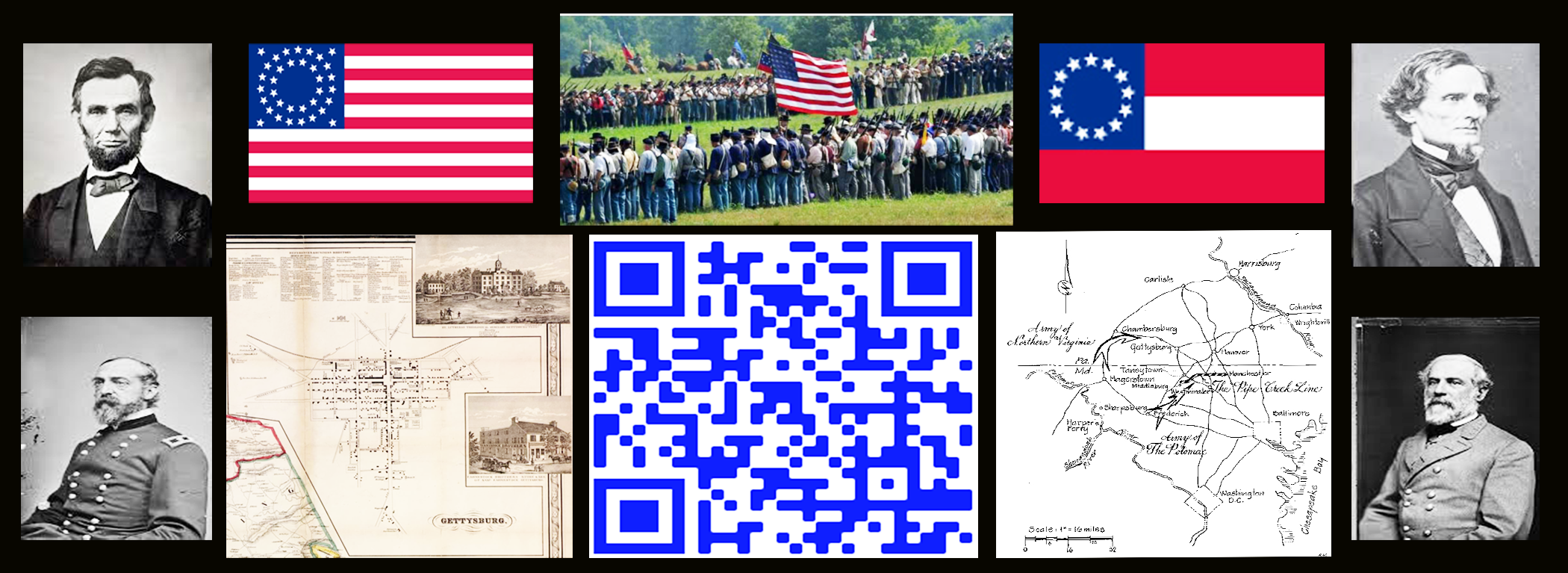GEN Meade awoke on the morning of 4 July to find his army surrounded. HOW did that happen?
LTG Longstreet had convinced GEN Lee that his planned attack by MG Pickett was doomed to failure and had to be aborted. At the war council on the afternoon of 3 July, Lee and his 3 Corps Commanders decided on some bold moves. Lee’s chess pieces were about to shift!
First Lee sent MG Stuart’s cavalry to the south to interdict supplies and re-enforcements coming up from Westminster. (see section 23d) Then he moved MG Pickett’s Division to the southern end of Seminary Ridge. There they set up their camp just out of cannon range. Lastly, MG Rodes’ Division marched through the city, past Early and behind Johnson and encamped to the SE of Culp’s Hill. By the end of the day, the Army of the Potomac (AoP) was essentially surrounded! Cut off from supplies and communication.

By Monday 6 July the situation within the AoP enclave was getting desperate. Food, water and sanitation were all a problem. The few natural springs and wells at the farmsteads were inadequate to meet the continuous demands of 100,000 men and horses. The few kitchen wagons that the corps had brought with them were struggling to feed the army. Horse meat stew was the fare of the day. The draught animals were the first to be sacrificed. There was little else to add to the broth but meat and marrow. There was little in the way of grass to even graze the horses. The heavy rains of 3-5 July worsened the overall level of sanitation.
The Army of Northern Virginia (ANV) had settled into a true siege mentality. The only ‘attacks’ were a daily artillery barrage of the cemetery from Seminary Ridge. The men were hunkered down in their tents enjoying a multi-course meal of meat, vegetables and bread with fruit for dessert!
Meade knew that he had to do SOMETHING, but what? Surrender was out of the question. His only true hope was to try to reach his supply cache at Westminster, nearly 20 miles away. Sixth Corps would lead the effort. The Union Cavalry would screen to the south and west trying to fend off Stuart. Fifth Corps would move down from Little Round Top and shift south, trying to keep Pickett’s Division from attacking 6th’s flank.
In order, the 12th, 3rd (the remnants anyway), 11th, 1st and 2nd would follow. The latter as the main rear guard. Horse teams would be assembled from the healthiest of the animals available and the rest of the artillery destroyed. Meade hoped that he could get most of his army moving before the ANV surged over the ‘castle walls’ to attack.
Third Corps would move via the Baltimore Pike and lag behind a bit to screen against Rodes’ Division moving to attack the marching column. When Second Corps arrived, they’d shift south and the two corps would act as the rear guard along the Pike. All the others would move down the Taneytown Road or simply march cross-country if the congestion became too bad. Fifth Corps would be the last to depart, acting as the west flank rear guard. All of the West Point graduates had studied Napoleon’s tragic retreat from Russia; at least it wasn’t winter.
As soon as the movement was detected, Longstreet argued from a full-on attack. Lee was a bit more cautious. He did order Pickett and Rodes to move south to harass them, but he wasn’t sure if perhaps there were re-enforcements awaiting, having been brought up from Baltimore. There weren’t!
The breakout had begun in the early hours of 8 July. By nightfall, all but the slowest stragglers had crossed Pipe Creek. There, Sixth Corps had established a hasty defense line guarding the retreat where the two main routes converged on Westminster.
Lee decided against a full on attack. Even a debilitated and wounded AoP was a formidable force. He sent A.P. Hill’s Corps west via Cashtown immediately. Longstreet would pursue the AoP to the south then withdraw through Emmittsburg. Ewell would follow, passing through Taneytown. Lee had few worries that Meade would be capable of launching any type of counter-attack. With his men hungry and ill and with little artillery, Meade would be content just to get most of them to Westminster alive!
By noon 9 July, Meade had resigned in disgrace at having been out maneuvered if not overtly defeated by Lee. Although the AoP remained largely intact, it would be some time before they would rehabilitate themselves and return to Virginia. Lee’s generals started a pool to see who could guess Meade’s replacement!
The Civil War dragged on…
